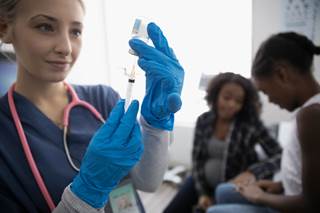Targeting the immune system to fight cancer is not new: in 1891, New York bone sarcoma surgeon William B. Coley injected a patient with an inoperable malignant tumor with streptococcal organisms. His theory was that the resulting severe bacterial infection, erysipelas, would stimulate the immune system, shrinking the tumor.
His hunch was right, and over the next 40 years he treated nearly 1000 patients with bone and soft tissue sarcoma with what became known as “Coley’s Toxins.”
Dr Coley’s work has now earned him the title of “Father of Immunotherapy,” foreshadowing today’s research in several immunotherapeutic approaches, including vaccines.1
“Vaccines have great potential in this modern era of cancer prevention and therapy, both used alone and in combination with other types of therapeutics,” Keith Knutson, PhD, professor of immunology and director of the discovery and translational laboratories cancer research program at the Mayo Clinic in Jacksonville, Florida, told Cancer Therapy Advisor.
“We have only begun to understand how to make them and how to test in the clinic. Most prior vaccines were tested in advanced, bulky, heavily pretreated cancer, which we know now is not the appropriate setting for any type of vaccine, including those that target infectious disease.”
Several phase 1 and 2 clinical trials are evaluating 2 approaches for developing vaccines to treat and prevent breast and ovarian cancer. Both stimulate the immune system, 1 by reintroducing cells derived from a patient’s tumor along with a tumor-specific antigen, and the other by boosting T cell activity to recognize and attack tumors as well as residual cells.
Brian Czerniecki, MD, PhD, chair and senior member in the Moffitt Cancer Center department of breast oncology in Tampa, Florida, maintains that “vaccines would work best as adjuvants or in very early disease.” In fact, “vaccines have [a] very limited role in cancer immunotherapy. It is not simply ‘create a vaccine and it will automatically improve outcomes,’” he said in an interview with Cancer Therapy Advisor. “The type and stage of disease, the type of vaccine, antigens targeted, and staging can all affect outcomes of vaccines.”
In addition to having developed a dendritic cell (DC) vaccine targeting HER2/neu that regresses ductal carcinoma in situ (DCIS), Dr Czerniecki is pursuing the role of a HER2 pulsed DC vaccine in 2 trials to prevent invasive breast cancer recurrence, the first as an adjuvant (ClinicalTrials.gov Identifier: NCT02063724) and the second as a neoadjuvant treatment after chemotherapy (ClinicalTrials.gov Identifier: NCT02061423).
“We use the oncodriver HER2 because it is the main driver of the disease and eliminating it cripples cells,” he said. In DCIS, “our vaccine particularly targeted CD4 Th1 cells, which appear to be lost in HER2-expressing breast cancer.
“It appears these vaccines work best in early DCIS and may have an impact in preventing recurrence in patients with residual disease following neoadjuvant therapy. They will not work alone in active invasive breast cancer but may be critical to make other therapies like chemotherapy and HER2 targeted therapies more effective.”
Dr Czerniecki said he believes many vaccine trials have failed to date specifically because they lacked a critical target. “If you take it in the connotation of ‘just target anything, just because it’s on the cell,’ if it’s not important to the tumor, it doesn’t care about it. If you have an immune response against the tumor, it will just downregulate that protein if it doesn’t need it.
“What we haven’t paid so much attention to in the vaccine world is really going after drivers that the tumor needs to go,” he said.
Dr Knutson is conducting 2 phase 2 clinical trials using vaccines from TapImmune Inc., an immuno-oncology company based in Jacksonville, Florida, which licensed the technology from the Mayo Clinic in 2012. The vaccines — TPIV 110 and TPIV 200 — comprise proprietary peptide antigens that elicit both CD8+ and CD4+ immune responses.
In March, TapImmune received a $3.7 million grant from the US Department of Defense (DOD) for a phase 2 clinical study of women with DCIS using the company’s peptide HER2/neu-targeted T cell vaccine, TPIV 110. The trial, set to begin in the fall, will enroll 40 to 50 women with DCIS, which accounts for approximately 20% of US breast cancer cases. The vaccine will be administered 6 weeks prior to standard surgical resection.
“There are several vaccine approaches that are being tested in companies and academia that may be competitive for DCIS,” Dr Knutson said. “This, however, is a new indication for which there are few candidates.”
To read this full article in The Clearity Portal, please click here.


